初一下英语一般将来时
一般将来时知识点七年级
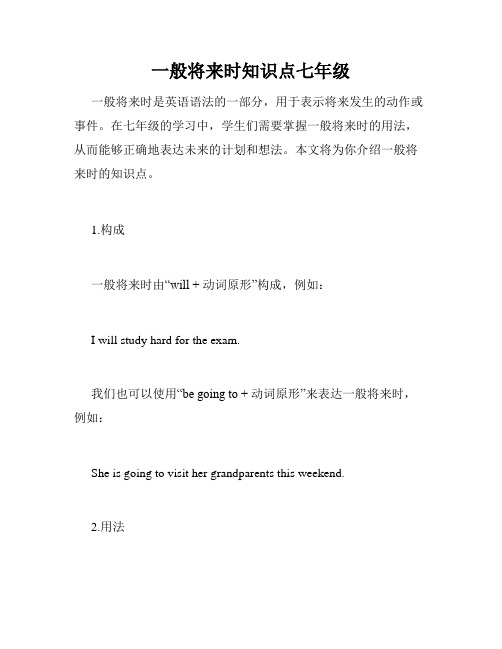
一般将来时知识点七年级一般将来时是英语语法的一部分,用于表示将来发生的动作或事件。
在七年级的学习中,学生们需要掌握一般将来时的用法,从而能够正确地表达未来的计划和想法。
本文将为你介绍一般将来时的知识点。
1.构成一般将来时由“will + 动词原形”构成,例如:I will study hard for the exam.我们也可以使用“be going to + 动词原形”来表达一般将来时,例如:She is going to visit her grandparents this weekend.2.用法(1)表示未来的计划和安排。
例如:We will have a picnic next Sunday.(2)表示预测或猜测。
例如:It will rain tomorrow.(3)表示意图、打算或决心。
例如:I will help you with your homework.(4)表示请求或提供帮助。
例如:Will you please lend me your pen?(5)表示愿望、要求或命令。
例如:I hope you will study hard.3.注意事项(1)will 通常用于第一人称和第二人称,而“be going to”通常用于第三人称。
例如:I will take the bus home.You will enjoy the party.He is going to buy a new car.(2)在口语中,我们可以缩略将来时形式。
例如:I'll call you later.We're going to the beach this weekend.(3)应该避免在句子中使用简单现在时代替将来时。
例如:Wrong: She flies to New York next week. Right: She will fly to New York next week.4.例子下面是一些使用一般将来时的例子:I will buy a new phone next month. Sandy is going to take French lessons.Will you go to the concert with me?They will have a party on Friday.I hope you will enjoy your vacation.总结在七年级的英语学习中,学生们需要掌握一般将来时的用法。
初中英语人教版七年级下册一般将来时
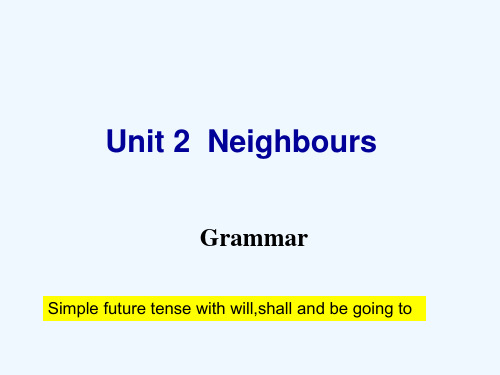
e.g. I will take an umbrella with me.
We usually use will. We only use shall with I or we, and this usage is becoming old-fashioned.
一般将来时的基本结构: will /shall(第一人称)+动词原形 be (am, is, are)going to+动词原形 常见的时间状语: • next Tuesday • next week • the coming Sunday • next year • this afternoon
疑问式: Shall/Will+主语+动词原形+其他
e.g. -- Will they go there to study English? -- Yes, they will. -- No, they will not.
Shall we have a drink? Shall I open the window? Where shall we have the meeting? shall, 表示说话人征求对方的意见。 Will you pass me that cup? Will you (please) help me with maths? Will you please lend me your pen? will 在陈述句中用于各人称, 在征求意见时 或者说话人向对方提出请求常用于第二人称。
Amy: How about your uncle?
Simon: He (6) ________________(make) a fire. is going to make
英语七年级下册人教版一般将来时和一般现在时两种时态笔记概念构成动词形式

英语七年级下册人教版一般将来时和一般现在时两种时态笔记概念构成动词形式1.一般现在时(1)结构:当主语是第三人称单数时,谓语动词用第三人称单数形式。
(2)动词的第三人称单数形式变化规则如下:①直接加s。
如:work-works。
②以“辅音字母+y”结尾的词,先变y为i,再加es。
如:carry-carries;cry-cries;try-tries;study一studies。
③以s,x,o,ch,sh结尾的词加es。
如:wash-washes;teach-teaches;go-goes;pass一passes;fix-fixes。
④特殊:have has;am/are is(3)用法:①表示习惯性的动作。
常与seldom,often,usually,always,sometimes,today,every day,once a week,every five minutes,on Sundays等时间状语连用。
如:I go to school at seven every day.我每天七点去上学。
②表示普遍真理和客观事实。
如:The earth goes around the sun.地球绕着太阳转。
③表示在现里所发生的一个动作。
如:Here comes the bus.公共汽车来了。
④在时间和条件状语从句中代替一般将来时。
如:I'll go shopping with my mother if sheis free tomorrow.如果明天我妈妈有空,我将和她去购物。
3.一般将来时(1)结构:助动词shall/will+动词原形;be going to+动词原形(2)用法:①表示将要发生的动作或状态,常用的时间状语有later(on),soon,in a month(in+时间段),next time,from now on,tomorrow等。
如:I shall be eighteen years old next year.明年我就18岁了。
初中英语主要时态系列——一般将来时讲解及练习【附中考真题及解析】
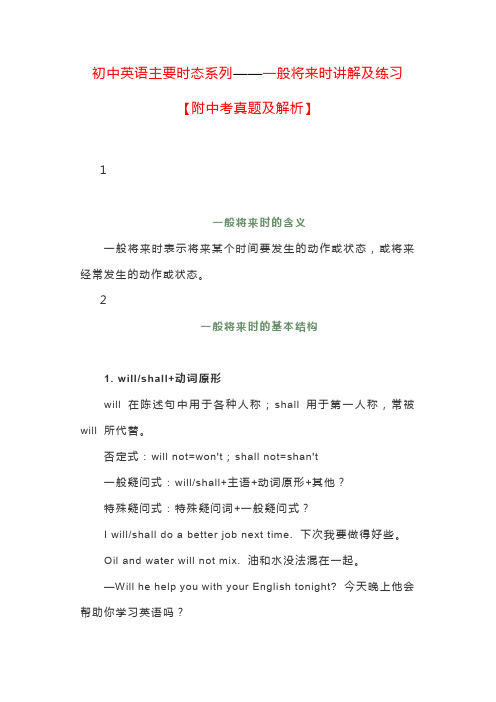
初中英语主要时态系列——一般将来时讲解及练习【附中考真题及解析】1一般将来时的含义一般将来时表示将来某个时间要发生的动作或状态,或将来经常发生的动作或状态。
2一般将来时的基本结构1. will/shall+动词原形will 在陈述句中用于各种人称;shall用于第一人称,常被will 所代替。
否定式:will not=won't;shall not=shan't一般疑问式:will/shall+主语+动词原形+其他?特殊疑问式:特殊疑问词+一般疑问式?I will/shall do a better job next time. 下次我要做得好些。
Oil and water will not mix. 油和水没法混在一起。
—Will he help you with your English tonight? 今天晚上他会帮助你学习英语吗?—Yes, he will./No, he won't. 是的,他会。
/不,他不会。
—When will you arrive for America? 你什么时候去美国?—Tomorrow. 明天。
2. am/is/are going to +动词原形否定式:am/is/are not going to +动词原形一般疑问式:am/is/are +主语+ going to + 动词原形+其他?特殊疑问式:特殊疑问词+一般疑问式?He is going to spend his holidays in London. 他打算在伦敦度假。
Look at the dark clouds. There is going to be a storm. 看那乌云,快要下雨了。
Is he going to collect any data for us? 他会帮我们收集数据吗?What are you going to do tomorrow? 明天你打算作什么?3一般将来时的用法will+动词原形与am/is/are going to +动词原形的用法虽然都表示将来发生动作或情况,一般情况下能互换。
(完整版)一般将来时初中语法
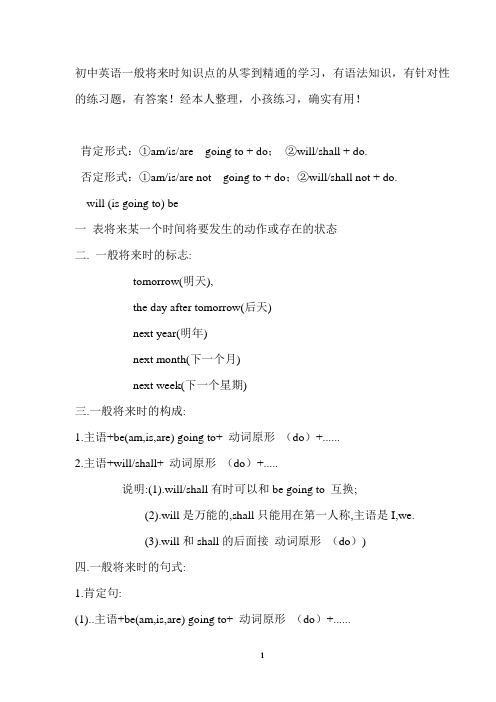
初中英语一般将来时知识点的从零到精通的学习,有语法知识,有针对性的练习题,有答案!经本人整理,小孩练习,确实有用!肯定形式:①am/is/are going to + do;②will/shall + do.否定形式:①am/is/are not going to + do;②will/shall not + do.will (is going to) be一表将来某一个时间将要发生的动作或存在的状态二. 一般将来时的标志:tomorrow(明天),the day after tomorrow(后天)next year(明年)next month(下一个月)next week(下一个星期)三.一般将来时的构成:1.主语+be(am,is,are) going to+ 动词原形(do)+......2.主语+will/shall+ 动词原形(do)+.....说明:(1).will/shall有时可以和be going to 互换;(2).will是万能的,shall只能用在第一人称,主语是I,we.(3).will和shall的后面接动词原形(do))四.一般将来时的句式:1.肯定句:(1)..主语+be(am,is,are) going to+ 动词原形(do)+......(2)..主语+will/shall+ 动词原形(do)+.....2.否定句:(1)..主语+be(am,is,are) not going to+ 动词原形(do)+......(2)..主语+will/shall not+ 动词原形(do)+.....3.一般疑问句:(1).Am/Is,Are+主语+going to+ 动词原形(do)+....(2).Will//shall+主语+ 动词原形(do)+...4.特殊疑问句:(1).What (Where, How...)+be (am,is,are)+主语+ going to + 动词原形(do)+...?(2). What (When,Where,How...) +will/shall+ 主语+ 动词原形(do)+...?二、基本结构:①be going to + do;②will+ do.三、否定句:在be动词(am, is, are)后加not或will后加not成won’t。
一般将来时(初一)

next week
What is he going to do next week? He is going to go fishing.
will
this evening
What is the mouse going to do this evening? It is going to do its homework.
2.一般将来时结构
பைடு நூலகம்
will /shall +动词原形 be going to +动词原形 Spring will come again. Tomorrow will be Sunday.
Is there going to be a party tomorrow evening?
3.一般将来时的用法
1.定义:一般将来时表示在将来某一
时间将要发生的动作或存在的状态, 也可表示将来某一段时间内经常发生 的动作或存在的状态。
She will go to the park tomorrow.
--- What are you going to do this evening? --- I am going to do my lessons.
4.一般将来时的特殊表示方法
2.be going to与will的区别
1. be going to 表示近期、眼下就要发 生的事情,will 表示的将来时间则较远 一些,如: He is going to write a letter tonight. He will write a book one day.
2. be going to 表示根据主观判断将来 肯定发生的事情,will表示客观上将来 势必发生的事情。 He is seriously ill. He is going to die. He will be twenty years old.
完整)初中一般将来时讲解
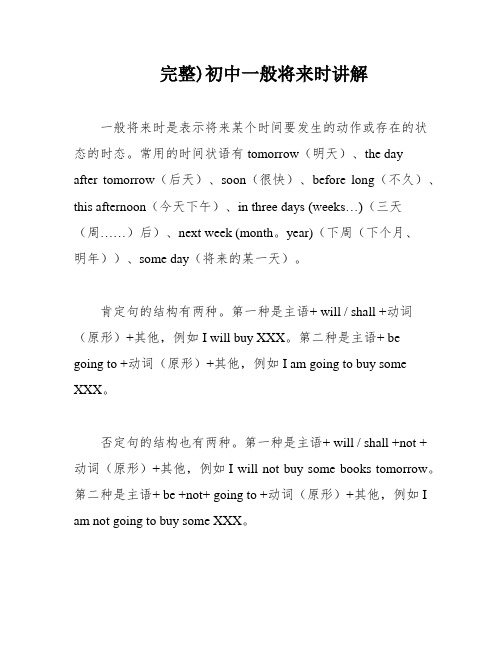
完整)初中一般将来时讲解一般将来时是表示将来某个时间要发生的动作或存在的状态的时态。
常用的时间状语有tomorrow(明天)、the dayafter tomorrow(后天)、soon(很快)、before long(不久)、this afternoon(今天下午)、in three days (weeks…)(三天(周……)后)、next week (month。
year)(下周(下个月、明年))、some day(将来的某一天)。
肯定句的结构有两种。
第一种是主语+ will / shall +动词(原形)+其他,例如I will buy XXX。
第二种是主语+ be going to +动词(原形)+其他,例如I am going to buy some XXX。
否定句的结构也有两种。
第一种是主语+ will / shall +not +动词(原形)+其他,例如I will not buy some books tomorrow。
第二种是主语+ be +not+ going to +动词(原形)+其他,例如I am not going to buy some XXX。
疑问句的结构也很简单。
第一种是Will / Shall +主语+动词原形+其他…?例如XXX?第二种是Be +主语+going to +动词原形+其他…?例如Are you going to buy some books tomorrow?肯定回答有两种方式。
第一种是Yes,主语+will,例如Yes。
I will。
第二种是Yes,主语+ be,例如Yes。
I am。
否定回答也有两种方式。
第一种是No,主语+will +not,例如No。
I will not。
第二种是No,主语+be + not,例如No。
I am not。
除了一般将来时,还有其他表示将来的时态,如be going to、be to(高中)、be about to(初中)。
初中英语语法汇总(一般将来时)

初中英语语法汇总(一般将来时)初中英语语法汇总〔一般将来时〕一、一般将来时的定义一般将来时表示在如今看来即将要发生的动作或存在的状态。
常用时间副词tomorrow, soon或短语next year / week / month, in a few days, in the future, sometime 做状语。
二、一般将来时的基本用法及构成〔1〕一般将来时的基本用法是表示单纯的将来事实,由"will / shall + 动词原形'构成:〔shall只用于第一人称〕例句:We shall have a lot of rain next month. 下个月将下许多雨。
I think she will pass the exam. 我想他考试会及格的。
〔2〕"be going to+动词原形'用来表示事先考虑过的将要发生的动作以及已有迹象说明必将要发生的某事,意为"准备;就要'。
如:1. Were going to meet outside the school gate. 我们准备在校门口见面。
2. Look! Its going to rain. 瞧!快下雨了。
(3) 用"be to+动词原形'表示。
主要表示按打算或支配即将要发生的动作;有时也表示指令、禁止或可能性:He is to leave for Beijing tomorrow. 他确定明天去北京。
Tell him hes not to be back late. 告知他不准迟回。
(4) 用"be about to+动词原形'表示。
主要表示即将要发生的事:He is about to leave. 他即将要离开。
Sit down, everyone. The film is about to start. 大家坐好,电影马上就要开发始了。
注:该结构通常不与具体的时间状语连用:误:He is about to leave soon [tomorrow].另外,该结构在美国英语中还可表示"准备'(主要用于否认句):Im not about to lend him any more money. 我不准备再借给他任何钱。
- 1、下载文档前请自行甄别文档内容的完整性,平台不提供额外的编辑、内容补充、找答案等附加服务。
- 2、"仅部分预览"的文档,不可在线预览部分如存在完整性等问题,可反馈申请退款(可完整预览的文档不适用该条件!)。
- 3、如文档侵犯您的权益,请联系客服反馈,我们会尽快为您处理(人工客服工作时间:9:00-18:30)。
初一下英语一般将来时第三讲:一般将来时一、定义:一般将来时表示将来某一时刻的动作或状态,或将来某一段时间内经常的动作或状态。
1.表示将来某一时刻的动作或状态:e.g. She will buy a new bike tomorrow.We will drive to the park next week.I shall visit my grandparents this weekend.They are going to play computer games this evening.I am going to have a big meal.2.将来某一段时间内经常的动作或状态:e.g. He is gong to have a big house next year .She will have a daughter.The cat will have a master.The dog will have a house.二、常与一般将来时连用的词:1. 时间状语系列:next Tuesdaynext weeknext yearthe coming Sundaythis afternoontomorrowtonightin a few minutesin the futurein five yearsfrom now onsoon三、一般将来时的构成1. will/shall的一般将来时构成:主语 + will/shall + 动词原形+其它I will/shall go to Beijing next week.主语是第一人称时 ----- shall主语为任何人称时 ----- will否定句的构成: 主语 + will/shall not + 动词原形+其它will not = won’tshall not= shan’t【活学活用】按照要求改写句子1、My teacher will teach us next term.(改为否定句)___________________________________________2、I shall not buy new clothes this month.(改为肯定句)___________________________________________3、She is playing computer games.(改为将来时)___________________________________________4、We shan't take part in the football match.(改为肯定句)___________________________________________5、I visit my grandparents every weekend.((改为将来时)___________________________________________2. be going to的一般将来时构成:主语+ be going to + 动词原形+ 其他She is going to play basketball this afternoon.主语是”I”时 ----- am主语为单数时 ----- is主语为复数及you时 ----- are否定句的构成: 主语 + be not going to + 动词原形+ 其他She is not going to play basketball this afternoon.is not = isn’tam not = ’m notare not = aren’twill或shall与be going to区别:1. will或shall用法总结:1)表示一个将来的动作或状态,“要…,会…”She will go to the park tomorrow.2)表示不以人的意志为转移的自然发展的事。
Tom will be 18 next year.Spring will come again.Tomorrow will be Sunday.3) will+v 有时表示说话是临时决定或打算。
--- My car won’t start.---Don’t worry, I will come and give it a push.2. be going to用法总结:1)用来表示按计划或安排要发生的动作,“准备;打算”。
这种主观意图,一般已做过事先安排,故其实现的可能性较大We are going to have a class meeting this afternoon.(安排)2)表示根据现有情况、某种迹象,判断将要或即将发生的动作。
此时不含有主观意图,只是表示说话人对客观事态发展的判断或推测Look at the black clouds. It's going to rain.Look, the tree is going to fall.【活学活用】填入适当的be动词。
1.She ______( be not) going to live in Beijing next year.2.My parents _______(be not ) going to teach in this school.3. They _____(be) going to play computer games this evening.4. I ______(be) going to have a big meal.5. I______going to go there next month.6. He____going to visit his grandparents next year.7. They ______ going to find a new house to live in.8. He ______(be not) going to see the movie.9. You _____(be not) going to work on the farm this weekend.10. We ______(be not) going to have a meeting this afternoon.3. 一般疑问句含will/shall的一般疑问句Will he go there?will/shall 主语动词原形其它Yes,he will. No,she won’t.will/shall+主语+动词原形+其它?肯定回答:Yes,主语+will/shall否定回答:No,主语+will/shall+not注意:在回答时,主语要用相应的代词代替含will/shall一般疑问句的改写秘诀:一调二改三问号;一调:即把句中的will/shall调到主语前;二改:改换主语称谓,即将句中的主语I my mine we our ours等第一人称分别改为相应的第二人称you your yours等;三问号:句末的句号改为问号含be going to的一般疑问句Is he going to play basketball there?be动词主语going to 动词原形其它Yes,he is. No,she isn’t.Be动词+主语+going to+动词原形+其它?肯定回答:Yes,主语+be否定回答:No,主语+be+not注意:在回答时,主语要用相应的代词代替含be going to一般疑问句的改写秘诀:一调二改三问号;一调:即把句中的be调到主语前;二改:改换主语称谓,即将句中的主语I my mine we our ours等第一人称分别改为相应的第二人称you your yours等;三问号:句末的句号改为问号【活学活用】将下列句子改为一般疑问句并做肯定和否定回答1. I am going to have a party tomorrow.__________________________________________________________________________________2. He is going to write to his friends.__________________________________________________________________________________3. They are going to buy a new car.__________________________________________________________________________________4. I will have many presents.__________________________________________________________________________________5. They will do heavy work.__________________________________________________________________________________6. There will be a computer in it.__________________________________________________________________________________4. 特殊疑问句以疑问词开头,对句中某一成分提问的句子叫特殊疑问句。
常用的疑问词有:what who whose which when where how why等。
其语序是:疑问词+一般疑问句语序? 如:What are you going to have tomorrow?What are you going to do tonight?How will you go there?What shall we do next?特殊疑问词+will/shall+主语+动词原形+其他?eg:Where will you go?特殊疑问词+be动词+主语+going to+动词原形+其它?eg:What is your mum going to do this weekend?注意:回答特殊疑问句时,不能用yes /no,即问什么答什么,尤其是简略回答。
如:Who is going to visit us?Helen (is).Where will we go to visit?Beijiao Park.【活学活用】一、选择正确的单词填空(可以多选)(who, where, which, why, when, how )1. ______ will you do next?2. ______ will you do this job?3. ______ are you going to shop?4. ______are you going ?5. ______ will he come back?6. ______country will Tom choose?7. ______ shall Ido?8. ______ will your parents go to work tomorrow?9. ______ are you going to Beijing?10. ______ will she stay next week?二、就画线部分提问1. They will eat at 12:00.________________________________________________ _2.She is going to swim in the sea.________________________________________________ _3. She will swim in the sea.________________________________________________ _4. Daming is going to drink a Cola.________________________________________________ _5. Daming is going to drink a Cola.________________________________________________ _6.Alex is going to play basketball with me this afternoon.________________________________________________ _7.We will get up early tomorrow morning.________________________________________________ _8.There will be an English test next Thursday.________________________________________________ _9.We are going to watch the football game.________________________________________________ _10.We are going to watch the football game.________________________________________________ _5. 其它的时态代将来的的情况:A. 用现在进行时表示。
